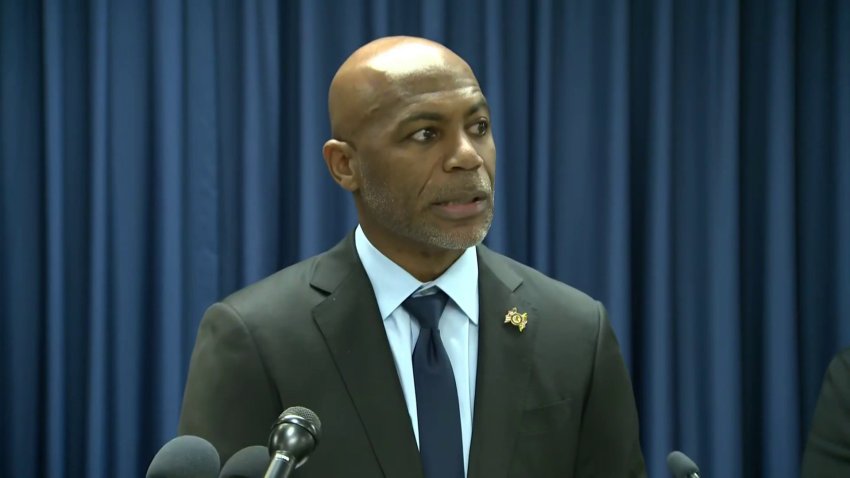Two people, including a known neo-Nazi leader, were arrested last week after the FBI interrupted their plot to attack the Baltimore power grid, the U.S. Attorney for the District of Maryland announced Monday morning.
The FBI views the two people, identified as Sara Clendaniel and Brandon Russell, as "racially or ethnically motivated" extremists.
Stream NBC4 newscasts for free right here, right now.
NBC News reports that Russell is a known neo-Nazi and founder of the Atomwaffen Division, a neo-Nazi group bent on "ushering in the collapse of civilization," according to the Southern Poverty Law Center. The group admires Charles Manson and supports "the idea of lone wolf violence," according to the Anti-Defamation League.
According to U.S. Attorney Erek Barron, the two were arrested on criminal complaints of conspiracy to destroy an energy facility, after they "took steps to shoot multiple electrical substations in the Baltimore area."
We have the news you need to know to start your day. Sign up for the First & 4Most morning newsletter — delivered to your inbox daily.
Conspiracy to destroy an energy facility is punishable by up to 20 years in prison.
Read the full criminal complaint document:
Local
Washington, D.C., Maryland and Virginia local news, events and information
One suspect was arrested in Maryland, while the other suspect was arrested in Florida. Clendaniel is a Catonsville, Maryland resident, and Russell is an Orlando, Florida resident.
Clendaniel was scheduled for an initial court appearance at 2:00 p.m. Monday in the U.S. District Court in Baltimore before U.S. Magistrate Judge Brendan Hurson. Russell was scheduled for his initial appearance in Orlando at 1:30 p.m. Monday.
According to the criminal complaint, the two discussed their plans to destroy electrical substations in Baltimore for several months, using multiple aliases to conceal their identities and acknowledging the illegal nature of their plans in their messages.
"Russell posted links to open-source maps of infrastructure, which included the locations of electrical substations, and he described how a small number of attacks on substations could cause a “cascading failure,"" the U.S. Justice Department's news release on the arrests said. "Russell also discussed maximizing the impact of the planned attack by hitting multiple substations at one time."
In a Monday morning news conference about the plot and the two arrests, Barron added that the criminal complaint against the two suspects states they were "aiming to, quote, 'completely destroy this whole city.'"

Thomas J. Sobocinski, the FBI special agent in charge of the Baltimore field office, added that the two suspects "were not just talking, but taking steps to fulfill their threats and further their extremist goals," which was "to inflict maximum harm on the power grid, a key component of our critical infrastructure."
That power grid controls, among other things, electricity and heating for homes, hospitals and businesses in the Baltimore area, Sobocinski said during the news conference.
Exelon and Baltimore Gas and Electric (BGE) released a statement on the plot and the arrests on Monday morning, stating there was "no damage to any of the substations, nor was any service disrupted."
"The Federal Bureau of Investigation has notified Exelon and BGE that it has disrupted a plot to target several BGE electric substations with gunfire," the statement read.
"We are working closely with the FBI and state and local law enforcement as they continue their investigation, and we are thankful for their vigilance and the precautions taken to protect the electric grid for our customers and employees. Law enforcement acted before the perpetrators were able to carry out their plan, and there was no damage to any of the substations, nor was any service disrupted."
BGE added that "the substations are not believed to have been targeted out of any connection to BGE or Exelon, or because of any particular vulnerability," and there are no known threats to any substations or other BGE facilities.
Sobocinksi said that the FBI's interruption of the conspiracy to attack the power grid is part of the FBI's work to identify and disrupt "terrorist plots."
The FBI worked with Maryland State Police, Baltimore County Police, the Department of Justice's National Security Division and the United States Attorney's Office for the Middle District of Florida to stop the two suspects, arrest them and charge them with conspiracy to attack the Baltimore power grid, Barron said.
Sobocinski joined Barron in assuring Baltimore residents that they are now safe.
"Marylanders can rest assured that a threat to disrupt their daily lives by attacking the local power grid has been stopped," Sobocinski said.
"Together we are using every legal means necessary to keep Marylanders safe and to disrupt hate-fueled violence," Barron said. "When we are united, hate cannot win."
The plot centering on Baltimore comes after several attacks on electrical substations in recent months, including several in Oregon and Washington state in late November, and two in North Carolina in early December.
It is unclear whether the previous attacks are related to extremist groups or to the Baltimore plot, but the increase in gunfire attacks highlights the relative ease with which electrical substations can be targeted, leading to mass power outages and general mayhem.
This is a developing story. Stay with News4 for updates.



